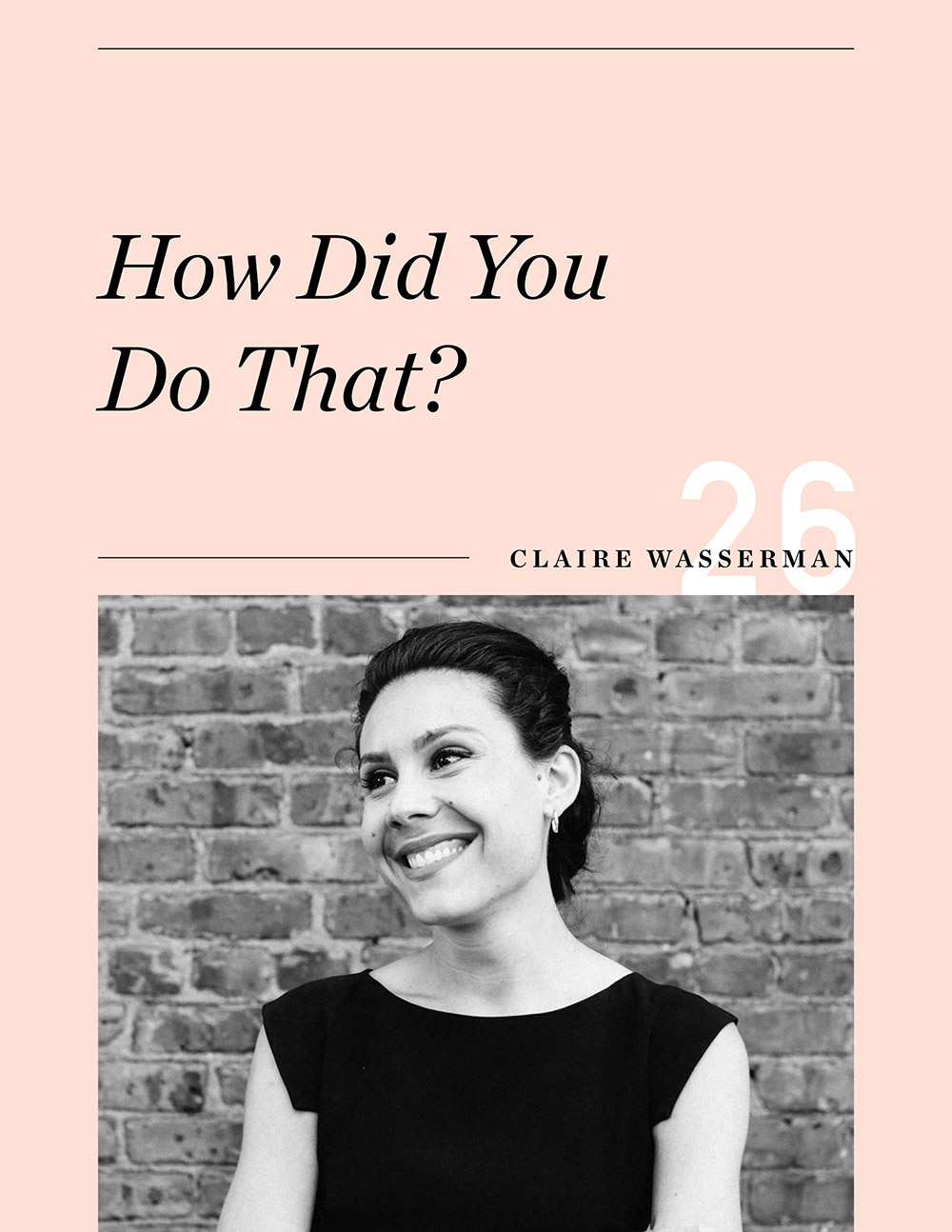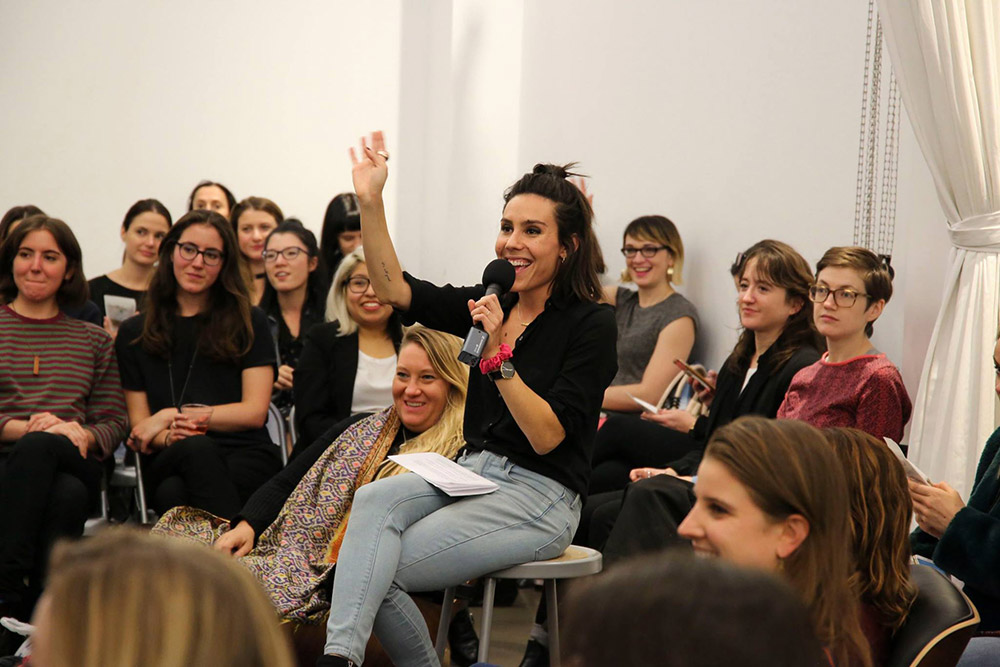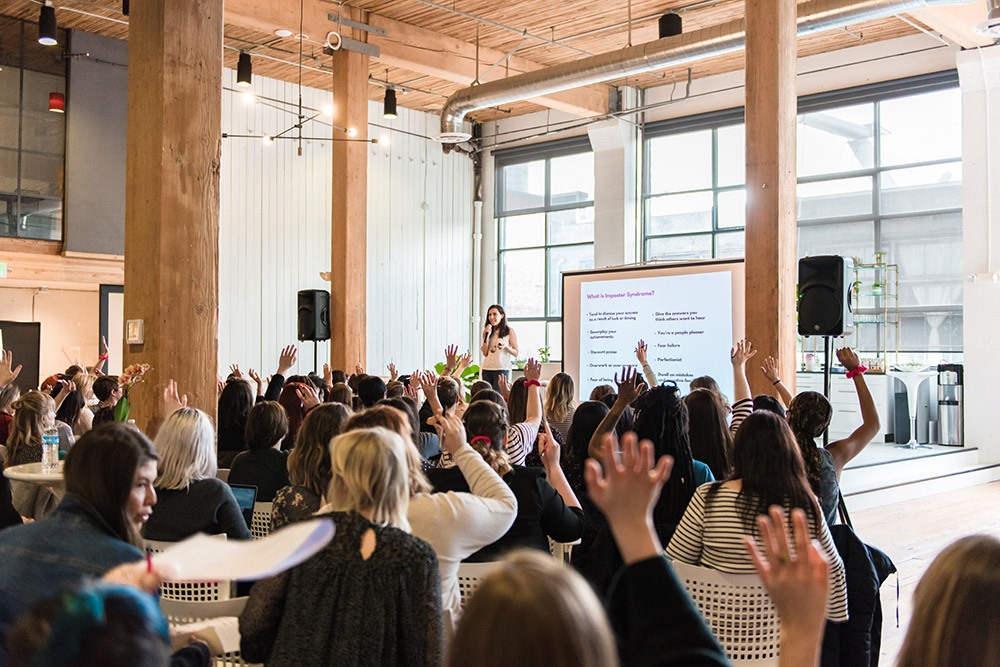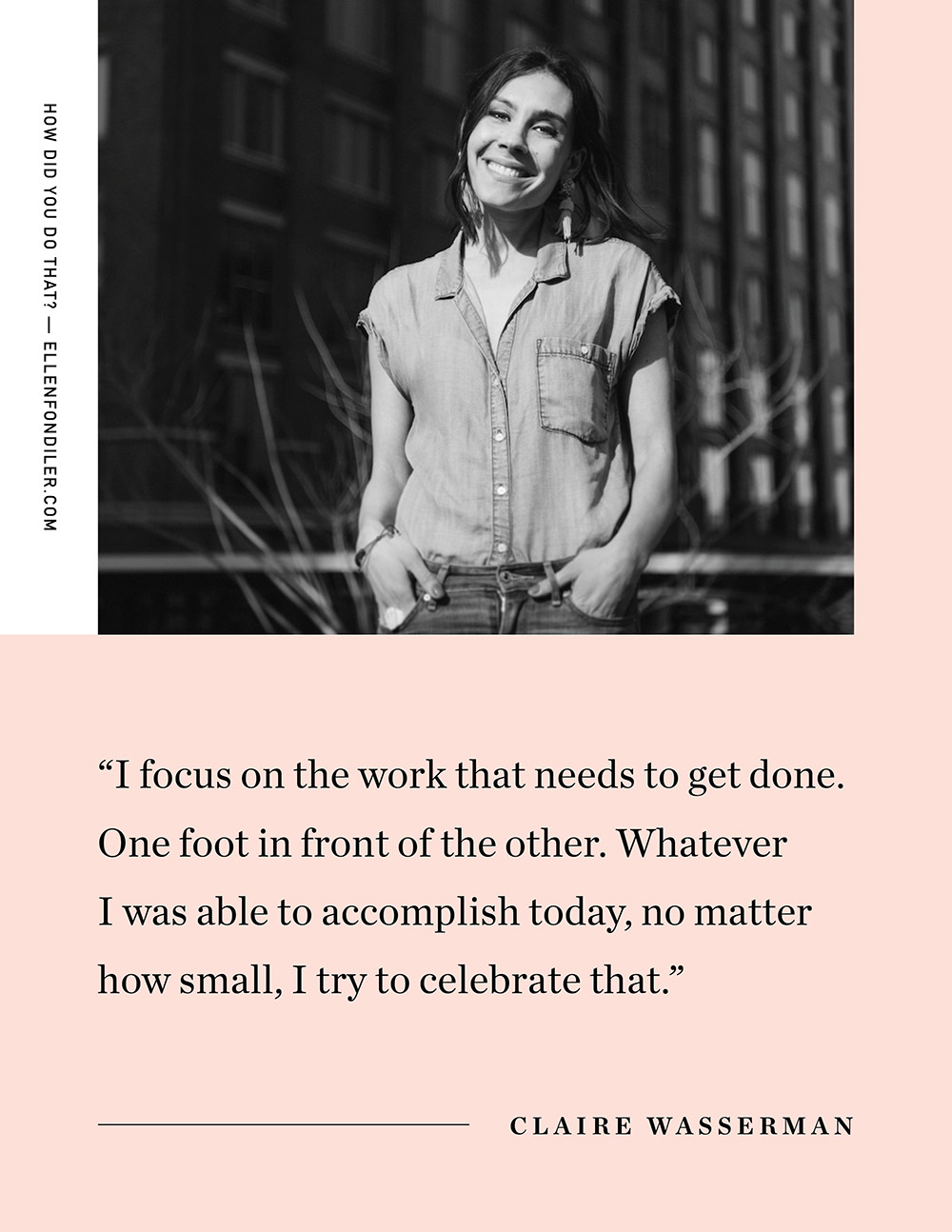
Whenever I meet someone who’s got a really cool job, who runs a thriving business, or who has completed an amazing project, I always want to know: “How did you do that?”
I’m always curious to hear the “behind-the-scenes story” — who they emailed, what they said, how they got their first client, how they got their foot in the door — the exact steps that they took to achieve their goal.
HOW DID YOU DO THAT? is an interview series where we get to hear the REAL story behind someone’s success—not the polished, neat and tidy version.
To see a complete list of all the interviews that have been completed to date, head over here.

Name: Claire Wasserman
Location: New York City
Profession: Founder of Ladies Get Paid
Claire, you’re the founder of Ladies Get Paid, an organization that teaches women how to determine what they could—and should—be earning at work, ask for the salary they deserve, and get it.
You started Ladies Get Paid because you’re discouraged about the fact that women typically earn much less than their male colleagues, and you want to change that.
I’m wondering… can you remember “the moment” when the idea for Ladies Get Paid came into your brain? Did you bolt upright in bed one day and declare, “I’m going to create my own company!” Or was it a more gradual realization? Walk us through the story of how it all started.
The idea came to me gradually. It all started with some emails that were exchanged privately between me and a few of my friends.
What happened was, about three years ago, I went to an advertising festival in the South of France. It’s a very fancy event where companies send their CEOs and their top people. And, as you can probably imagine, there were a lot of white older men.
I walked into a party and this older guy came up to me, and the first thing out of his mouth was, “Whose wife are you?” And that really set the tone for the rest of the week. It was a combination of not being taken seriously and being objectified. I went back home and just felt really gross. I was tired of being treated this way, and I decided to write a personal essay about what I had experienced.
I sent this essay to some of my friends. I was curious if they had had similar experiences. They said, “Yes,” and they urged me to post the essay online. I really did not feel like that was a good idea. I worried that by publicly announcing that I had concerns with men that I would be labeled a “man hater.” At the time, I was afraid. So instead, I said to my friends, “Why don’t you forward the essay to your friends, and we can share it, but let’s keep it private, just in our inboxes.”
So, you wrote this essay. You’re circulating it privately to your friends, and they’re forwarding it to their friends. Your essay is percolating around, landing in people’s inboxes, being read by people who’ve never met you. What happened next?
Women started writing to me, sharing their own stories. The stories kept unfolding. The more I read, the more I learned about the problems that women face in the workplace—not being taken seriously, not being respected, being underestimated, and also, the lack of women in leadership positions, and how the wage gap is even worse than what I thought.
It’s often stated that for every dollar a man earns, a woman—with equal education, skills, and experience, doing the same job—will earn around 78 cents. Is that accurate?
I thought it was 78 cents to the dollar, but it never dawned on me that that totally depends on the color of your skin. And I was ashamed that I, an educated person, wasn’t aware of the fact that a Hispanic women make 55 cents to the dollar, not 78. And if I didn’t know it, then maybe other people didn’t know it, too.
For about a year, I read people’s stories, I researched, and I immersed myself in the reality of women in the workplace. I wanted to do something to fix these huge, systemic problems, but I had no clue what to do.
Eventually, I had an idea, which was to host a discussion for women—like a town hall meeting. I invited women to attend, and I said, “Come and talk about money.”
Why money? Why not sexual harassment, or some other problem that women deal with in the workplace?
I chose money because it represents power, self-worth, value and identity.
100 women showed up for that first event. It was a really cathartic experience. People shared their stories and frustrations, and after that first event, it was really clear that women had a lot of questions about salary negotiation and money in general: “What should my salary be?” “How do I ask for more?” “What if they say no?” “If I’m self-employed, what should I be charging per hour?” “How do I find salary information?”
“When I ask for a raise, what, exactly, am I supposed to say?”
Right after that first event, I emailed those 100 women and I invited them to join a Slack group so that we could keep the conversation going. Two days later, these women just kept talking and talking and talking on Slack. There was so much energy and engagement. That’s when I realized, “I am onto something really special here.”
Two weeks later, I quit my job so that I could focus on turning Ladies Get Paid into a business, do more events and classes, and grow this project into something bigger.
Wow! So it all started with one essay, and then one event, and then an online discussion group, and then you took the plunge and decided, “This is going to be my full time career.” You’ve got serious chutzpah. I love that. Did you feel anxious about quitting your job and becoming an entrepreneur? Did you have doubts?
Oh my god, one million percent. I’ve definitely, definitely, definitely experience doubts, partly because I’m a perfectionist. I’m very hard on myself.
But something that I remind myself, often, is that men will typically apply for a job if they meet 60% of the requirements, whereas a woman will want to meet at least 90% before she’ll apply. So when I’m doubting my abilities, sometimes I ask myself, “Would a guy feel like this?” Probably not. He would probably think, “Oh, I can do this. No problem.”
That’s great to remember! When a woman is sitting there wondering, “Can I really do this?”, somewhere, out there, there’s probably a man with equal—or fewer—qualifications who feels perfectly capable of doing it.
Do you have any other tips on how to deal with doubts and insecurities?
I try to reframe everything I do as a “learning experience” instead of a “failed task.” I know that’s easier said than done, but it really does help. Before I give a speech in front of a crowd, instead of focusing on, “Okay, did I memorize my lines?” or, “I hope I’m good,” or any of that, I try to remind myself, ”I am walking into this experience with one goal, and that is to see what I can learn from it.”
I also keep track of nice things that people say to me. When I get emails that are really lovely, I take screenshots of them and keep them in a folder. That helps me to remember that I am having a positive effect on people. It’s easy to dismiss that.
How many women have joined the Ladies Get Paid community, at this point?
We have close to 15,000 now.

Wow! It’s impressive to be able to build that kind of community, especially so quickly. What are some things you’ve done to spread the word? What has helped to attract new fans and community members?
Mainly, it’s been word-of-mouth. Also, partnerships. With every Ladies Get Paid event, I try to partner with other women’s groups. We do some cross-promotion with our partners. Like, I’ll put your events on my social media if you do it on yours. I also bring speakers into these events, and I rely on them to help spread the word to their own communities.
Really, though, it all comes back to word-of-mouth. I think what we’re doing is pretty different from other women’s organizations out there. The atmosphere at the events, and in the online community, is really special. Women come and experience it, then they talk about it to their friends, and the word spreads.
What has been the most discouraging or frustrating moment in this journey thus far, and how did you get through it?
I’ve been harassed and threatened by men’s rights groups. These are groups of men who think it’s wrong for me to produce events geared towards women because they feel excluded, and think it’s unfair, even discriminatory. It’s really disheartening, because my goal is never to exclude, my goal is to give women the tools to feel stronger and build confidence and earn what they deserve.
That sounds incredibly stressful. How do you take care of yourself and stay focused when difficult things are going on?
I focus on the work that needs to get done. One foot in front of the other. Whatever I was able to accomplish today, no matter how small, I try to celebrate that. It could be something really small like answering all of my emails and getting to inbox zero. That’s still something, and helps me to see that things are moving forward.

Pretend you’re sitting down for coffee with a woman who suspects she could be earning more than what she currently is. She’d like to ask for a raise, but she doesn’t know how, or she’s nervous to say anything to her boss. What are three pieces of advice that you’d give her?
1. First, gather information.
What is the range of salaries that a person in your position makes, based on where you live, how many years of experience and skills you have, and the size of the company? Start by finding that out.
You can use websites like salary.com and glassdoor.com to find salary information. But don’t stop there. Talk to people. Ask your friends. If they don’t know anybody who works in your industry, ask them to ask their friends. Say, “Here’s the ballpark of the salaries that I found online. Here’s what I’m currently earning. Here’s what I’d like to be earning. Am I off base? Does this seem reasonable to you?”
2. Come up with three numbers: high, middle, and bottom line.
First, pick a very high salary. A big number, maybe a lot higher than anything you’ve asked for in the past. This is the very highest of the salary range, maybe a little bit higher. Don’t be embarrassed to say it. You need to practice saying it out loud to get used to it.
Then, pick a middle number. The middle number is something that you’d feel really good about getting, something you’d be proud to get.
Then, pick a bottom line number. This is an interesting one. The way that you actually figure out your bottom line is, you make a budget of all the things that make you, you. Not just the surviving you, but the thriving you. How much does it cost to live the life you want to live? If you want organic groceries, if you want SoulCycle classes, whatever makes you feel productive and happy, write it down, and total it up.
You look at your three numbers. Then you go in, and you ask for even more. And you go in with a back-up plan. If they can’t give you the salary you want, come up with a salary package that includes money and other, intangible forms of compensation: training, networking, mentorship, vacation time, whatever is most valuable to you.
3. Don’t ‘demand’ more money. Make a strong case for it.
This means talking about your accomplishments in terms that your employer can understand. You’re not “begging” for more money or “demanding” it. You’re stating the facts about what you’ve done in the past, and putting together a strong case for why you ought to be paid more.
That’s great advice, Claire, and I would also add… check out the Ladies Get Paid blog for more advice, starting with this post. Also, listen to the Lady Talk podcast, especially Episode 1: How to negotiate.
Thanks for sharing your story with us, Claire!
ONE MORE THING…
Do you have “one more quick question” that you’d like to ask Claire? Email me and tell me what you want to know! I might choose your question for my ONE MORE THING… Podcast (Coming soon!!!)
YOUR #1 CAREER GOAL: ACHIEVED
Do you need some encouragement to help you achieve a big, daunting career goal? Would you like to have a career coach/strategist in your corner—feeding you ideas that you’d never considered before, helping you figure out who to contact, and what to say, and checking in to make sure you don’t procrastinate? If so… click here to find out how we can work together. I’d love to coach you!
![]()
